
Fat Loss vs. Weight Loss

When you have a weight loss goal, the “normal” thing to do is get out that bathroom scale and use that as your indicator of progress. What we’ve found time and time again, however, is that the scale kind of sucks at telling us the full story.
Does this sound familiar: you start your weight loss efforts by watching what you eat (especially carbs), and you get in more workouts. Overall, you feel good, your pants are a little looser, and the scale goes down a few pounds. But then it’s been a few months and the scale starts to go up. UP! Are you kidding? You feel defeated, you think your body is broken.
Why does this happen? Long story short: there’s a big difference between fat loss and weight loss, so let’s talk about it.
Weight Loss
Weight loss refers to the decrease in your body weight (your gravitational pull on the earth essentially), which includes your muscle mass, water mass, skeletal mass, and fat mass.
When someone loses weight, they are not necessarily losing weight ONLY from their fat stores. It’s often coming from fat and muscle, especially when the weight loss strategy includes a large calorie deficit and working out a lot more.
We often also see a big weight change coming from water mass or fluid when a big decrease in carbohydrate intake occurs. This is expected because the body uses water to store carbs in the body (also known as glycogen). We actually need 3-4 grams of water for every gram of stored carb. If you significantly pull back on your carb intake, most people see a big drop on the scale at first, but this will return to normal when eating carbs normally again.
Fat Loss
Fat loss refers to the decrease in stored body fat (or adipose tissue) without also losing muscle mass.
You might see a change on the scale while losing only body fat, but you might also see very few changes because overall body composition is changing at the same time.
Body composition changes are tricky to capture on the scale because one of the best ways to only lose body fat without losing muscle is by strength training. So, while your body is burning fat efficiently, you would also be gaining muscle mass, and that means the scale weight is not going to change very much for a lot of people.
Granted, if you have a lot of body fat to lose and you’re consistently strength training, you would eventually see a decreased weight pattern because the fat lost would outweigh muscle mass gained.
A better way to monitor fat loss is through measurements, pictures, and how clothes are fitting!
The perfect example of this is our VIP client Andrea. Going by the scale, we would think she didn’t make any progress, but her pictures tell us a completely different story. She also had access to a body composition scale at her gym, so we could see her fat mass decreasing and her muscle mass increasing over time!
Why a goal of fat loss is the way to go:
Focusing on weight loss alone can lead you to a few dead ends. Let me explain:
- Weight loss can be achieved rather quickly by largely decreasing calories and exercising more, but as soon as you stop doing this (because you probably can’t do this your whole life), the weight will return.
- If you are losing weight but you aren’t focusing on maintaining muscle mass by eating enough protein or strength training, you could be decreasing your metabolism, and this can lead to difficulty maintaining the weight loss long-term and a high chance of weight regain (and even in a surplus!)
- If you are losing weight by eating fewer calories, you’ll have to keep lowering your calories to keep seeing more weight loss or maintaining it.
Here’s why focusing on fat loss is better long-term:
- You will maintain your lean muscle tissue! This means your metabolism stays revved and you’re able to burn fat efficiently (and keep it off).
- You won’t have to keep decreasing your calories over time to maintain your body composition changes. In fact, you can eat a lot more food because your metabolism is so much healthier with this focus.
- You’re not mentally chained to the scale. If you have a goal of fat loss, you’re focused on taking care of yourself internally (managing your stress, getting enough sleep, balancing your blood sugar, etc.) and you don’t need the scale to validate your efforts anymore. How your clothes fit, measurements, and pictures over time will tell the story.
- You will age better! Maintaining your muscle as you age is THE best way to preserve your body density, keep your metabolic rate higher, and keep good mobility. You will also have a better experience and fewer symptoms going through menopause.
The only “downside” to a fat loss goal is that it truly does take more time and consistency. It’s easy to lose weight quickly, but my guess is that you don’t care about temporary weight loss. You want to feel good, have energy, be strong, and age gracefully….right?
How to achieve weight loss vs. fat loss:
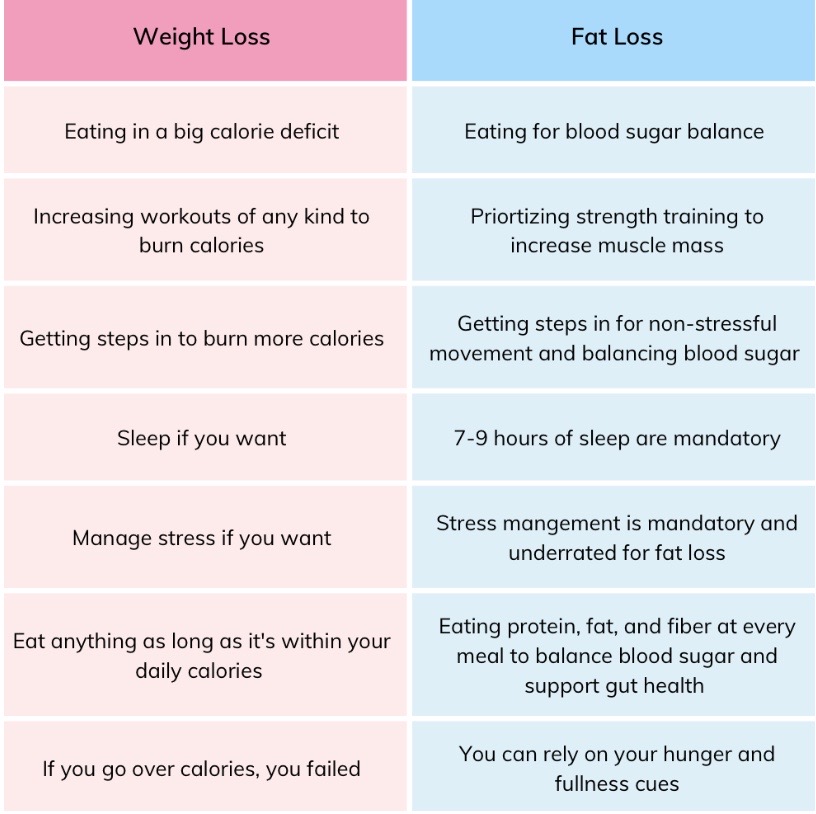
How your metabolism responds to weight loss vs. fat loss:
When the goal is weight loss, you’ll often see some good progress at the beginning if you’re eating a lot less food and exercising for calorie burn, but then things plateau. Eventually, you’ll see the weight begin to gradually return because the entire time weight loss was the focus, your metabolism was decreasing.
Why does the metabolism decrease here? It eventually adjusts to the fact that you’re eating a lot fewer calories (AND burning a lot more from exercise) so you’re requiring the body to run on essentially half a tank of gas everyday. Shortcuts have to be made, so the metabolism preserves energy and eventually stops being able to lose weight.
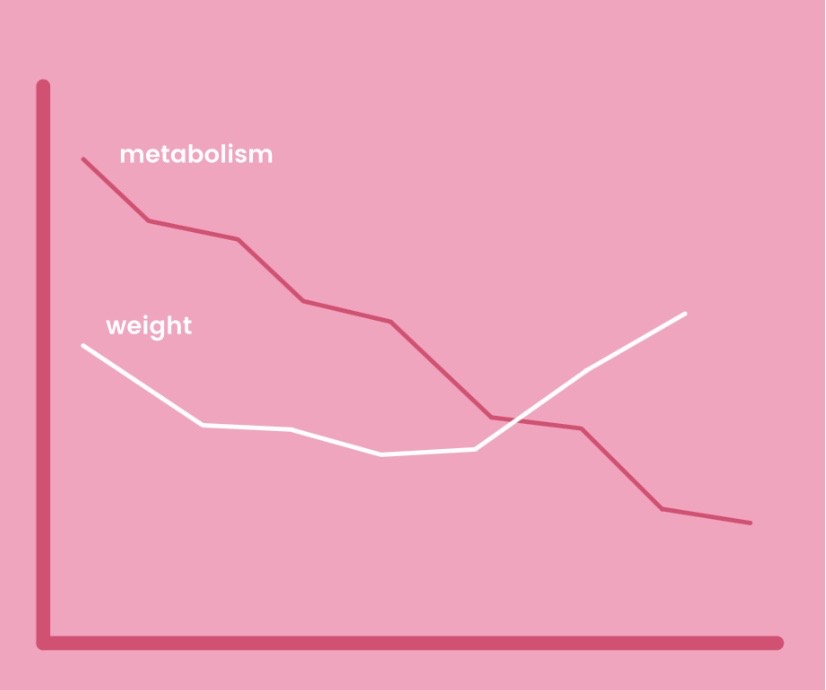
On the other hand, when the goal is fat loss, the metabolism increases over time! Your weight often minimally changes at first for a few reasons.
- It can take a few weeks to months for the stars to align and for fat loss to happen through better metabolic support.
- Body composition is starting to charge (more muscle) and the scale won’t show those changes at first.
- You’re not drastically cutting your calories or carbohydrates, so there isn’t a big shift in water weight.
So, while it can take longer to see weight changes, fat loss is probably happening regardless behind the scenes, and the metabolism increases over time! This is where focusing on progress photos, measurements, and how clothes fit comes in, especially at the beginning.
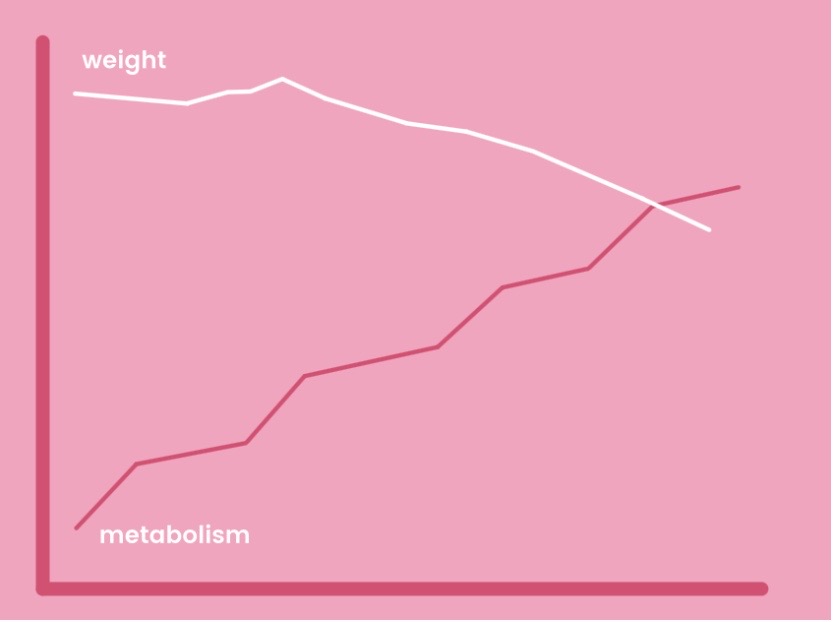
Are you stuck on the goal of weight loss?
If you have the goal of weight loss, I want to encourage you to think more deeply about this. Is it really only all about the scale for you? My guess is that it’s not, because I know you don’t want to lose weight of literally any kind.
I know you want to maintain the muscle tissue you have (and keep getting stronger).
I know you want to feel good in your clothes and pictures! (hello, muscle definition)
I know you don’t want to step on the scale every day and let that determine how you feel about yourself.
I know you want to eat! You don’t want to keep eating less food and focusing on your calories all the time.
Switching your mindset and goals to a fat loss focus is a total game-changer, and it’s why our members feel so. dang. good.
Check out some of these wins from Metabolism Makeover from our clients with a fat loss goal:
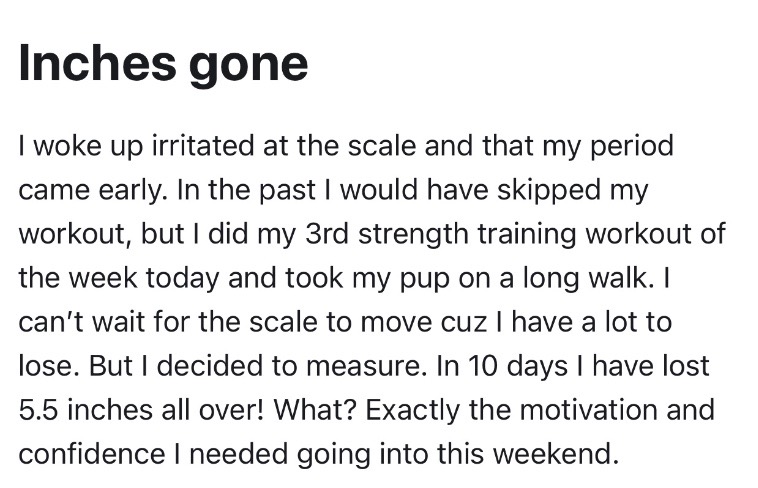
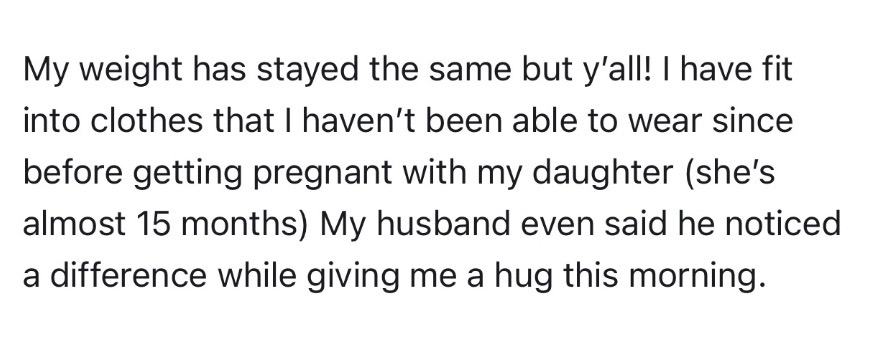
A weight loss goal would indicate failure, but a fat loss goal shows huge progress!!
If you’re ready to focus on fat loss instead of playing the weight loss game, get on the waitlist for Metabolism Makeover here, or if you’re ready for 1:1 support, learn more about VIP coaching here.
You got this!
Coach Elle

